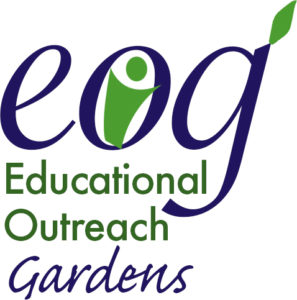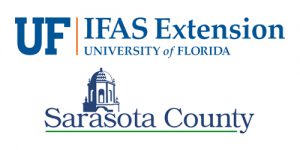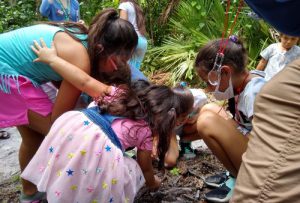All of us at Sarasota County Extension wish you a very Happy New Year. We have had a year of exciting new programs, new partners, and the pleasure of meeting many new community members to serve. I am proud to share some of our accomplishments over the last year and our vision for continued education and support for you in 2022.
A Look Back at 2021
Between October 2020 and September 2021 (the county’s fiscal year), Sarasota County Extension presented more than 311 online and in-person classes, with a registered audience of more than 19,000 people. We also produced 201 new educational videos. Our volunteers were also incredibly impactful in 2021, with 328 volunteers who provided time valued at over $359,000 in services to support our mission of education on landscaping, sustainability, and more.
During the economic downturn over the last year, our services to low-income residents were particularly important. The Family Nutrition Program (FNP) provides education to residents eligible for the Supplemental Nutrition Assistance program (SNAP, formerly food stamps). They delivered 153 health and nutrition lessons to low-income community members, impacting 861 families and supported an additional 6,000 people through systems changes like gardens, produce support, and more at youth organizations, schools and community organizations. Our Energy Upgrade program provided 1,300 residents with efficiency devices and education to help them save on their utility bills. And thanks to local foundations, our Partners for Green Places program helped nonprofits serving low income populations with grants for energy and solar improvements.
Our workforce training programs continued to be essential supports for local businesses and their employees. Trainings for workers in the “green industries” were provided in partnership with others in our region to help landscapers prepare for licensing exams and maintain required continued education credits in fertilizer, pesticide application and more. The Green Business Partnership supported businesses in their efforts to reduce operating costs through sustainability improvements. And the Florida Master Naturalist programs we offered supported environmental professionals from ecotourism businesses, government agencies, and more.
We helped over 30 school gardens despite pandemic limitations. And we completed a new 25 class series on edible gardening that was incredibly well received. All the materials are now on our website for future reference. Other new series on topics like Florida wildlife, invasive species, Age Friendly, and healthy grocery shopping were also launched last year and will continue going forward.
Water quality was a particularly important effort for us over the last year. We provided pond consultations to HOAs, training to professional pond managers , launched a bay friendly fertilizing tool for users of reclaimed water, provided many FL Friendly landscaping and coastal education workshops, irrigation evaluations, and shared a comprehensive look at the county’s water quality efforts on a webinar with over 150 attendees and a new county water quality webpage.
The 4-H Youth Development program offered a day camp, school enrichment programs, and community clubs to engage hundreds of youth in pursuing their passions and growing their leadership and life skills.
A multi-year initiative resulted in significant progress in reaching new audiences through partnerships with groups like Unidos Now, Girls Inc., Sarasota Housing Authority, and more. Youth, in particular, were exposed to new opportunities and environmental education and field trips through summer camp experiences.
This is only a sampling of the incredible work done by our Sarasota County Extension team over the last year. It was our pleasure to support community members in learning about what interests them and helping find science-based solutions for their lives.
Looking Forward to 2022
As we look forward to 2022, we have many new programs planned as well as a continuation of our foundational work. Some of our 2022 departmental priorities are outlined below, but sign up for our eNewsletters and watch our social media pages to be sure you don’t miss the latest opportunities.
We have several grants we are excited about for the coming year. A multi-agency Healthy Ponds Collaborative has been funded by the Charles and Margery Barancik Foundation. We will be supporting this effort by developing a stormwater pond best practices manual and providing continued consultations on making local stormwater ponds healthier. We also will be working on an ongoing grant from the Florida Department of Agriculture and Consumer Services to support affordable housing providers in increased energy efficiency, saving their tenants money on their utility bills.
Our Master Gardener Volunteers are busy planning and fundraising for the Educational Outreach Garden, a vision that would trans form our Twin Lakes Extension Office into a destination demonstration garden for the community. If you’re interested in learning more or supporting this effort you can visit the Master Gardener Volunteers’ Friends of Sarasota County Parks webpage.
form our Twin Lakes Extension Office into a destination demonstration garden for the community. If you’re interested in learning more or supporting this effort you can visit the Master Gardener Volunteers’ Friends of Sarasota County Parks webpage.
We also have several initiatives we will be working on to improve our online educational materials in areas such as wildlife, invasive species, and community and demonstration gardens. Stay tuned for more webpages, interactive online tools, on demand classes, and more over the coming year.
We’ll of course be continuing our classes and presentations, blogs, videos, and more to help educate our community on topics of interest to you. Visit our website or give us a call at 941-861-5000 to learn more. We look forward to learning how we can serve you in 2022!
About Us
As a partnership between Sarasota County and the University of Florida, Sarasota County UF/IFAS Extension and Sustainability translates the research of the university into educational programs and technical support for Sarasota County residents and businesses. We have local experts on everything from agriculture, youth development, landscapes and natural resources, to nutrition, waste reduction, water quality, and sustainability.
 0
0

